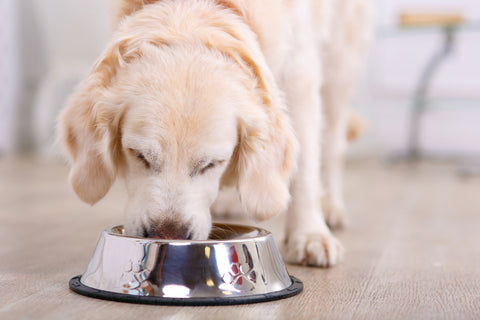
How to help your dog’s sensitive stomach
From probiotics for dogs to food allergies, it’s all here…
Does your dog have a sensitive stomach when it comes to feeding time? Don’t worry, you’re not alone. With careful research and planning, tummy sensitivities and ‘oops moments’ can become a thing of the past. Read on to have your questions answered about diets for dogs with special requirements, and how probiotics for dogs can support their digestion.
What do you mean by ‘sensitive stomach’?
Just like people, some pets don’t always get on with every kind of food. You may find that after a change of food, your previously happy-go-lucky dog gets very windy, has runny poos and seems out of sorts. Or, you may find that your new doggy addition doesn’t thrive on the food you’ve favoured for years with other furry family members.

Is your dog feeling a little off-colour?
What are the signs of a sensitive stomach?
There are a few things you can look out for which may mean your dog’s digestive system needs a little extra support:
- Loose or runny stools
- Lots of wind
- Poor appetite
- Dull coat
- Poor overall health
- A change in the amount of poo or toileting frequency
- 'Accidents' around the house
Can sensitive digestion be a sign of something else?
Yes. If you’re concerned at all, it’s important to visit your vet for a check-up. Digestive 'moments' can be a sign of something else going on too, and as dogs can be scavengers, your pet may have eaten something they shouldn’t have.
When should I visit the vet straightaway about my dog’s digestion?
- There are some signs that you mustn’t ignore. If your dog is experiencing any of the below, head to the vet as soon as you can:
- Blood in poo
- Vomiting (more than once)
- Unsettled tummy for 3 or more days
- Unplanned weight loss
- Lethargy (seeming to have no energy or sleeping a lot)
- Changes in stools – look out for mucus or blood in poo, or black or grey stools
- Signs of abdominal pain – sensitivity when you touch their tummy or seeming protective of their abdomen.
Visiting the vet can ease your mind and double check their overall health. Once you’re sure there isn’t anything serious going on, you can start investigating diet management to support your dog’s quality of life… the rest of the family will thank you, too!
How do you soothe a dog’s sensitive stomach?
There’s no one-size-fits-all solution when it comes to finding the right diet for dogs with sensitive digestion, so we’re going to run through some options and ideas for you to try. Remember, when changing your dog’s food, always do it gradually over the course of a week. Start with 3/4 old food, 1/4 new food, and gradually change the ratio until your pet gets 100% new food.
Try a veterinary diet: It’s likely that your vet will carry their own preferred ‘sensitive’ food – a veterinary diet created especially for dogs sensitive to food intolerances. These foods can be a great place to start if you’re not sure what it is your dog is reacting to.
Don’t forget treats: Treats and chews may contain ingredients that unsettle sensitive dogs too, so check the ingredients carefully and opt for all-natural products like dried fish skin or dried liver where you can.
Consider probiotics for dogs: Sensitive tummies can be caused by difficulty digesting food as well as changes in diet, stress and scavenging. Thankfully though, probiotics can support their digestive system to cope with the ups and downs of life.
Can probiotics for dogs really help?
In a word, yes. A good digestive health supplement will bolster the natural population of health-protecting bacteria in your pet’s digestive system. They compete with ‘bad’ bacteria for nutrients and block points where the pathogens try to attach.
Meanwhile, prebiotics – a special type of carbohydrate – benefit your pet by supporting ‘good’ bacteria. There’s lots more on how this works on our YuDIGEST Dog page.
If your dog has a tendency to have lots of tummy sensitivities, it might be worth considering YuDIGEST Dog and YuDIGEST PLUS for Dogs – both provide a veterinary strength complex of gut-supporting natural ingredients, including a unique high strength BioActiv probiotic and prebiotic formula. Together they help keep your pet's digestion in tip top condition.

With a little help, you can get your dog’s digestion on track.
How do elimination diets for dogs work?
An elimination diet is a way of discovering what triggers your dog’s tummy troubles by limiting ingredients in the food they eat, then testing new additions one at a time for 10-12 weeks and gauging your pet’s reaction. By isolating certain ingredients, you can understand what makes your dog’s stomach sensitive and what doesn’t.
If you’re considering an elimination diet, you’ll need to really do your research and talk to your vet before you begin. They can give you expert advice on the plan you’ve chosen, suggest alternatives if it’s not quite right for your dog, and keep an eye on things so your best friend stays happy and healthy throughout the process.
Once you know which food gives your dog sensitivities, you can start looking at different diets that avoid those ingredients. It’s best to do this with the support of your vet or a qualified veterinary nutritionist – they can help to guide you through all the great options out there, so you can find the diet that’s right for your dog.
What kind of foods can dogs be sensitive to?
Much like with people, food sensitivities are very much down to the individual dog. Foods that often cause trouble include:
- Beef and lamb
- Chicken and turkey
- Milk and milk products
- Eggs and egg products
- Soy
- Fish
- Veggies
- Carbs like rice and potato
- ‘Novel proteins’ – protein not commonly found in petfood, like as duck, venison and rabbit
What alternative dog diets could I consider?
If you’re struggling to find a commercial pet food that suits your dog, all is not lost! Tinned dog meat and kibble is a relatively modern invention – and there are other options out there.
Homemade food
It’s possible to make your own dog food, so long as you make sure your pet is getting the right mix of energy, protein and nutrients for their breed, age, life stage and lifestyle. As sensitivities vary from dog to dog, you’ll need to research recipes and talk to your vet to make sure you’re providing a healthy, balanced diet. Broadly speaking, a healthy homemade diet should include:
- Protein from meat or fish
- Fibre from carbs
- Fats and fatty acids
- Vitamins and minerals
- Water for hydration – not all dogs drink enough!
It’s important to research home-made diets carefully, be aware of foods that dogs find toxic (like onions, grapes and avocados), consider supplements to ensure balance, and watch their calorie intake too!
Feeding raw
Raw feeding is an emotive topic in the doggy community – people always have an opinion about it! Anecdotally speaking, we know lots of pet parents who have seen sensitive dogs thrive when they switch to raw, but there are downsides and risks too. Making sure your dog is getting the right balance of energy and nutrients isn’t easy, and you’ll need to think more about food prep (and storage) than you might if dishing up a serving of kibble.
If you’re interested in raw feeding, again we’d recommend carefully doing your research, knowing the risks and talking to your vet.
If you try some of the tips in this article, we’d love if they’ve helped your dog. Please do leave a comment – or join in the conversation on our Facebook page.





